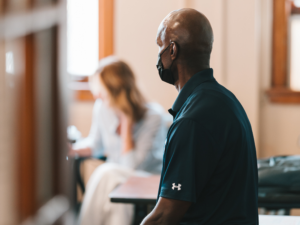Teaching American Values in a Time of Protest

At a time when it feels like the fabric of the nation is pulling apart, news that the rising generation is lacking in knowledge of civics, history, and geography doesn’t inspire hope in restored unity. On the most recent National Assessment of Educational Progress (NAEP), 76% of eighth-graders scored below proficient in civics, about the same as when the test was administered in 2014. In US History, 85% scored below proficient, up from 82% in 2014. On the geography test, 75% of students scored below proficient, compared with 73% in 2014.
We might reasonably wonder how our national divides can be mended if some critical mass of the citizenry doesn’t share an understanding of the ideals and purposes that underlie our society, doesn’t know how our institutions work, isn’t familiar with the physical territory we call home — and doesn’t grasp how these things have served to hold us together as a people over time.
Perhaps then there is no greater urgency for education than in rededicating it to the vital work of transmitting the shared knowledge and values that, in our best moments, unify us as a nation.
America has always faced the problem of how to keep itself together. The amalgamation of diverse people with varied backgrounds, traditions, and experiences has been the source of the country’s vitality, but also has made it difficult for us to establish a common identity and shared sense of community. American culture, in its challenge and appeal, has worked like a jazz number, balancing the tension between improvisation and reinvention on one hand, and structure and coherence on the other.
We’ve traditionally relied on a shared set of values as our source of coherence, though it’s not easy to get agreement on a definitive or comprehensive set of American values, especially in these polarized times, as demonstrated this year at a symposium on civic education held at the American Enterprise Institute. Nevertheless, in our ongoing democratic experiment at least a few ideals rise uncontested to the level of core values: the citizen’s right to vote, for instance; equality under the law; the individual’s unfettered opportunity to develop and prosper; the guarantee that we may speak our minds in public and come together to effect change.
Historically, the public school system has been a key means by which American values get transmitted from generation to generation. A primary rationale for creating “common schools” in the 19th century was to prepare Americans of every stripe for active and responsible participation in civic life. As FDR would assert in the mid- 20th century, “That the schools make worthy citizens is the most important responsibility placed on them.”
But in recent times, our school system has let slip its critical responsibility for making worthy citizens. In the age of accountability tests, civics, geography, and history have been deemphasized, when not cut from the curriculum altogether. The dismal NAEP results in these areas show that they’re not a priority, even though they serve as important vectors for transmitting our values from one generation to the next.
Further, a vision of public schools as a training ground for workers, and not for active citizens, has prevailed in recent times, and with it a loss of the shared values that come with a deep and meaningful understanding of our history, our civic institutions, and our vast, beautiful, and productive land. Economic prosperity is one of our cultural values, but not the only one. It seems past time for educators, parents, students, and policymakers to interrogate the relationship between career preparation and preparation for citizenship.
We need to reinvigorate civics, history and geography in public school education, because they confer to students indispensable knowledge, of course, but also because they are how we promulgate the values that unify us as a people. Without education in that body of shared knowledge and values, it’s difficult to see ourselves, in all our diversity, as one people who unite behind our ideals despite our differences.
The current wave of political action and demonstration is evidence that civic education comes from places other than the classroom. But schools have a vital role to play in helping to inform an engaged citizenry, so that they learn from the past, know how to exercise their rights, and recognize what they share in common.
Though not evident in the NAEP scores, there has been a resurgent interest in civic education in recent years. Below are a few organizations that promote civic education and provide classroom resources:
- Civics Renewal Network: An alliance of 33 nonprofit, nonpartisan organizations that came together in 2013 to provide free online classroom resources for civics education.
- iCivics: Founded by Justice Sandra Day O’Connor in 2009, iCivics offers online games with the goal of cultivating “a new generation of students for thoughtful, active citizenship.”
- Center for Civic Education: A Standford-based nonprofit organization with roots going back to the sixties, the Center works to advance education in democratic citizenship in the US and other countries.
- Civics Education Initiative: An initiative of the Joe Foss Institute, begun in 2014 to get civic education back into the classroom and increase student civic awareness.
At the heart of American democracy is faith in the civic capabilities of ordinary people. That faith hinges on young adults emerging from the US public school system and into the civic life of the nation steeped in the knowledge and values necessary for keeping their society functioning and whole, and capable of recognizing their common cause and common ground as Americans. The need for education to reaffirm its role in maintaining our democracy has never been more apparent.
For more, see:
- Composer Helps Teachers To String Together Citizenship Learning Experiences
- How We Move Forward: Practicing Three Inclusive Anti-Racist Mindsets for Reopening Schools
- Summer Learning: 10 Professional Learning Experiences for Educators
Stay in-the-know with innovations in learning by signing up for the weekly Smart Update.






wimukthi bandara
this article is important